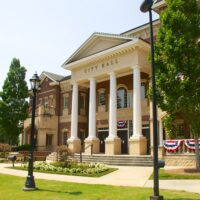Injuries on Federal & State Land – Parks and Office Buildings – Who pays for my injuries?

Any type of injury has the potential to cause devastating financial loss and ongoing pain and suffering. The one consolation for personal injury victims is that they have the right to sue the person or organization responsible for their injuries. However, this looks much different when the injury took place in a park or office building operated by a local, state, or federal government. The first difference is the deadline to file a claim. You have two years from the date of the accident in a typical personal injury case, but only one year when you file a claim against the government.
In Alabama, most injury claims on public property go through the Alabama Board of Adjustment. When making a claim, it’s important to be aware of whether the city knew about the potentially unsafe conditions that caused your accident. This can make a big difference in your outcome. Additionally, Alabama imposes a limit of $100,000 in municipal liability cases. This applies to claims against a city, town, or county. As a client of the Law Office of J. Allan Brown, LLC, you have the benefit of our years of experience with successful personal injury claims against all forms of government.
What You Should Know About Sovereign Immunity
In the earlier part of the 20th century, local, state, and federal governments protected themselves from paying damages in personal injury cases through a clause known as sovereign immunity. Essentially, it meant that people could not sue these forms of government for injuries caused by its employees or on its properties. In 1948, Congress passed legislation known as the Federal Tort Claims Act. This reduced the protection the federal government previously enjoyed against paying personal injury claims. Individual states followed suit and established tort claims acts of their own.
Local, state, and federal governments own and operate thousands of public properties, but for the sake of this blog post we intend to focus on parks and office buildings. Common examples of injuries or wrongful death that could occur in these settings include drowning in a public lake or falling down slippery stairs at an office building. In each of the cases, the government entity responsible for maintaining the property may be liable for damages.
Proving Government Negligence
Courts typically hold government agencies responsible for maintaining the same degree of care of its properties as it would for a private citizen or business. If the government agency responsible for the maintenance and upkeep of a property neglects its duties, it is legally liable to provide compensation to the injured party. This sounds straightforward, but remember that the burden of proving the government agency alone caused your injury lies entirely with you. You must meet the following conditions to prove negligence by the government:
- A local, state, or federal government agency owns and is responsible for maintaining safe conditions of the park or office building
- A condition that could reasonably cause injury existed on the property
- The agency representing the government knew or should have known that the danger existed
- The agency failed to correct the danger in a reasonable amount of time
- You did not cause your own injuries through reckless conduct or disobedience of posted safety rules
How to File a Claim for an Injury Incurred on Public Property
When a private individual or business causes injuries, the injured person initiates a claim by contacting the insurance company of the responsible party. With government claims, you must first notify the agency responsible for proper maintenance of the park or office building. Upon receipt, the government will either admit or deny your claim. This typically happens within 45 days. If denied, you retain the right to pursue a personal injury lawsuit.
The Federal Tort Claims Act (FTCA) imposes several restrictions on those filing a lawsuit against the government. These include:
- The person or people responsible for negligence must be government employees and not independent contractors
- For injuries on state property, the claim must be based on state law where the incident occurred
- Only claims of negligence, not intentional misconduct, qualify for a personal injury lawsuit
- The negligent conduct must have taken place while a government employee conducted official duties of his or her position
As you can see, there’s nothing ordinary about suing the government for personal injury damages. We invite you to contact the experienced personal injury attorneys at Law Office of J. Allan Brown, LLC at your convenience to discuss your case during a free consultation. We can be reached at (251) 473-6691 or online.




